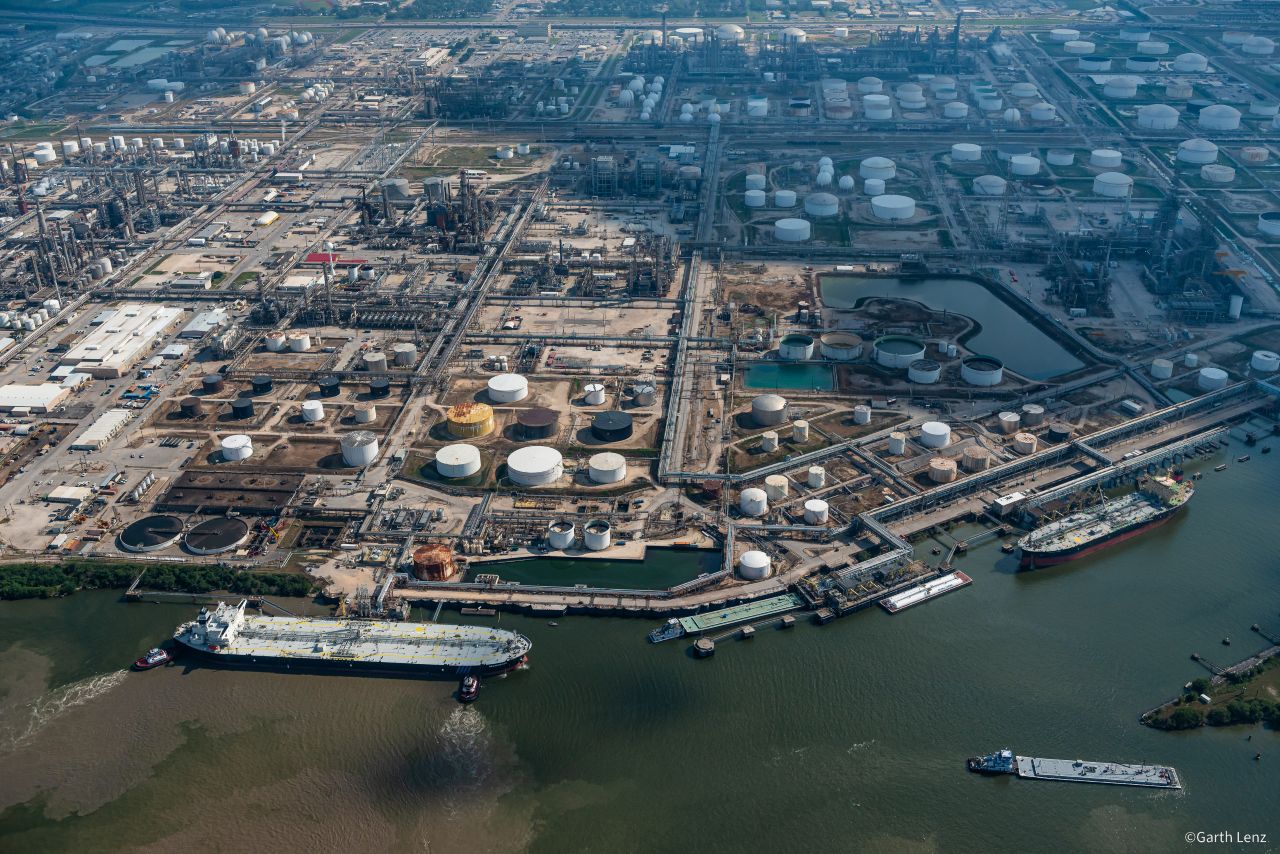Shell chemical plant that burned near Houston had a record of nearly 2,000 violations

The Shell chemical plant east of Houston that caught fire on Friday had a record of 1,946 environmental violations over the past decade, according to state records.
Of these violations, 95 at the Shell Deer Park Chemicals plant are still considered “active,” meaning the company has not yet resolved the problem, according to the records of the Texas Commission on Environmental Quality (TCEQ). These violations include the company’s failure to properly control gases venting from its equipment. Others had to do with paperwork problems, including “failure to provide documentation to evaluate compliance.”
Shell Deer Park has been hit with $1,643,690 in fines by environmental regulators since January 2012, according to TCEQ. Those fines came from 37 enforcement orders, including for the release of more than 40,000 pounds of a dangerous carcinogen (1,3-butadiene) from vents and a relief valve at the olefins plant over a nearly 24-hour period in January 2013.
A long track record of noncompliance at an industrial facility can indicate a culture that does not prioritize investments in plant safety and protections for the local community and environment.
The most recent incident unfolded at about 3 p.m. on Friday. Flames erupted from the plant at 5900 Highway 225 in Deer Park, beside the heavily industrialized Houston Ship Channel. The plumes of inky black smoke billowing over nearby neighborhoods were so large they were visible on weather radar.
Shell said on Monday that “air monitoring is ongoing and has not detected any harmful levels of chemicals affecting neighboring communities.”
Jennifer Hadayia, executive director of Air Alliance Houston, said she is skeptical. “Every time there is an event – a large-scale fire like what happened yesterday, or even everyday flares – industry representatives tell us there is no cause for concern, that the lingering smells, smoky air, and even itchy throats and coughs are ‘normal,'" she said. "History has shown that these early statements are for the benefit of industry public relations and not public health.”
According to Shell, the fire started at an olefins unit at the 1,500-acre chemical plant, which was originally built in the 1940s. Olefins are hydrocarbon chemicals produced from oil and gas that are used to make plastics, pharmaceuticals, pesticides, antifreeze, detergents, synthetic rubbers, and other products. “No injuries have been reported, though a small number of contract employees who were exposed to product are undergoing medical evaluation as a precaution,” the company said Friday.
The following day, on Saturday, Shell said the fire was extinguished. But later that day, the blaze reignited. Firefighters sprayed so much water to put out the blaze that the runoff filled up the plant’s storage ponds, leading the company to divert contaminated wastewater into the Houston Ship Channel.
By Monday, the fire had been doused again and the company said it had stopped discharging wastewater to the channel. “There is no danger to the nearby community,” the company said on Sunday, adding that it installed booms in the ship channel to try to stop chemicals from spreading into the waterway.
Although the cause and impact of the accident this past weekend are still unclear, history shows that the Deer Park plant has a long record of serious air and water pollution violations, according to a review of TCEQ and EPA records by Oil & Gas Watch.
EPA enforcement records indicate that the plant is currently in “high priority violation” of the Clean Air Act, with 12 of the last 12 quarters in noncompliance, according to EPA Enforcement and Compliance History Online (ECHO) database.
The EPA website also says the plant is in “significant/Category 1 noncompliance” with the Clean Water Act, with 10 of the last 12 quarters in noncompliance. The facility is also in “significant noncompliance” with hazardous waste management laws, with 12 of the last 12 quarters in noncompliance with the Resource and Conservation Recovery Act, according to EPA ECHO database.
A TCEQ database lists 1,946 violations at the Shell Deer Park plant dating back to 2012 that range from issues such as failure to maintain necessary paperwork or collect required data to serious pollution incidents. TCEQ categorizes violations by severity, using A, B, and C. Of the 1,946 total violations, 81 were type A, the most serious. Another 853 were type B, and another 1,012 were type C.
The more serious violations were for releasing harmful air pollutants. For example, a Aug. 19, 2022, document says the plant failed to keep its emissions of nitrogen oxides, volatile organic compounds, and carbon monoxide from three flares within the limits of its permit. These chemicals all contribute to ozone pollution, a key component of smog, which irritates and damages the lungs and is linked to asthma attacks and heart disease.
That violation was marked as “resolved” when the company submitted data that showed that its nitrogen oxide and carbon emissions returned to below the limits within hours.
Another violation on Aug. 19, 2022 cited Shell’s failure to maintain within permitted limits the hourly carbon monoxide emissions from apiece of equipment called a pyrolysis furnace. TCEQ considered that violation resolved when Shell provided data that showed emission dropped back down to below the limit.
The facility’s largest fine over the past decade came in October 2014, when TCEQ assessed a $400,000 penalty after the plant released tens of thousands of pounds of hazardous air pollution on Jan. 10, 2013. This included 31,352 pounds of 1,3-butadiene, a carcinogen, from vents and a relief valve on a boiler drum at its olefins plant over a nearly 24-hour period. Investigators found that this happened after material containing butadiene entered the boiler system through a pipe that had a partially stuck-open check valve.
Over a 15-day period that began on Jan. 12, 2013, investigators also found that the plant released nearly 41,821 pounds of butadiene, 39,144 pounds of benzene (another carcinogen), 1,563,422 pounds of ethylene, 41,821 pounds of propylene, and 75,613 pounds of other volatile organic compounds from part of its olefins plant. This happened after two motor-operated valves remained partially open when they should have been closed, according to state records.
The most recent violations for which the TCEQ fined Shell came after the plant released 23,808 pounds of volatile organic compounds over a 26-hour period that began Aug. 17, 2018. According to the Nov. 17, 2021, enforcement order, the emissions came from a leak in the pipe in the plant’s aromatic concentration unit. A covering around the pipe deteriorated, allowing moisture to accumulate and contributing to corrosion.
For that violation, TCEQ commissioners ruled that the “emissions event was not caused by a sudden unavoidable breakdown of equipment or process beyond the control of the owner or operator and could have been avoided by better design and/or better operational and maintenance practices,” the order states.
Another enforcement order dated March 31, 2021, was for water pollution from the facility. A state investigator found that the facility discharged excessive amounts of fecal bacterial – 57 percent above its permit limit – in May 2019, and more than double its permit limit in September 2019. The facility also discharged an average of 588 pounds of ammonia per day in May 2019, 68 percent above its permit limit. Ammonia is toxic to fish at low concentrations.
The enforcement order for the water pollution incident included a $18,500 fine. Shell had already paid $7,400 with another $3,700 deferred if Shell followed all the terms of the order. TCEQ allowed Shell to pay the remaining $7,400 to the Galveston Bay Foundation to support its “Marsh Mania” wetlands restoration program.
On May 4, Shell announced its latest earnings report. Earnings reached $9.6 billion in the first three months of 2023, and the company announced a $4 billion stock buyback program they expect to wrap up by the end of June. Stock buybacks are intended to lift a company’s value on the stock market without requiring investments in either plants or staff.
This article has been updated to correct the date the fire at the plant reignited.















